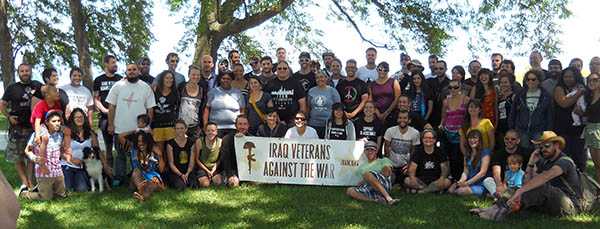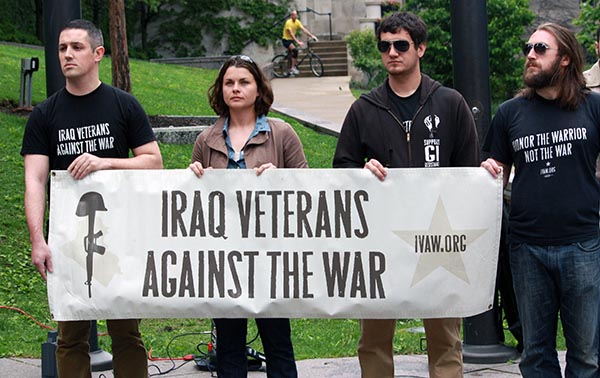 Download PDF of this full issue: v43n2.pdf (20 MB)
Download PDF of this full issue: v43n2.pdf (20 MB)From Vietnam Veterans Against the War, http://www.vvaw.org/veteran/article/?id=2480
 Download PDF of this full issue: v43n2.pdf (20 MB) Download PDF of this full issue: v43n2.pdf (20 MB) |
As part of their national convention in Chicago, Iraq Veterans Against the War (IVAW) presented a public form titled "21st Century American Militarism: Occupation Abroad and Resistance at Home" at the Chicago Temple on August 2, 2013. Featuring talks by Christian Parenti, Michael Rakowitz, Suraia Suhar, and Nick Turse, and followed by an interesting Q&A session, the approximately 250 people in attendance were treated to a stimulating discussion of war and militarism in the present day US Empire.
The powerful introduction to the event by Iraq veteran and evening master of ceremonies, Vince Emmanuele, tied militarism overseas to social devastation at home, was followed by a talk and video slide presentation by Nick Turse.
Turse, author of the recently-released book, "Kill Anything That Moves: The Real American War in Vietnam," began talking about his book and his experiences over a 12-year period of researching, traveling to Vietnam to interview Vietnamese survivors, and writing. Initially planning to do a Ph.D. dissertation on PTSD (post-traumatic stress disorder) among US veterans, Turse stumbled upon US Army documents detailing the war's destruction and devastation, and began reading. He read a wide range of the literature — now totaling over 30,000 books! — to provide context and understanding of the war. He traveled across the US, talking to US veterans about their experiences, what they did and/or what they saw. He traveled to Vietnam, locating and talking with survivors of the violence of the war. What he argued, showing some gruesome war-related photos so there would be little doubt, is that the war was really a war against Vietnamese civilians whom we were supposedly there to help.
He went further. He specifically discussed how the US Army, and, by implication the other services, did all they could to keep accounts from reaching the American public. Reports disappeared, those who reported were intimidated and threated, and those who refused to cower suffered retaliation. At the same time, the US media ignored the increasing number of reports of atrocities. He specifically talked about a case where Newsweek disemboweled a closely documented story that reported between 5,000-7,000 Vietnamese were killed (over 10 times the number of people killed at My Lai) by the 9th Division in the Mekong Delta.
Later, Turse said that the single most important thing he learned from his research was how all-consuming the war was to the Vietnamese. The Vietnamese had to continually negotiate their lives with the American soldiers and the war in general. He gave an example. When Americans attacked a village, they fired artillery first, sending the Vietnamese into their bomb shelters for protection. But after the artillery stopped, they had to decide how long they could stay safe in their shelters. If they waited too long, and the Americans arrived, they risked their lives because American troops would throw grenades into the bomb shelters to make sure no one was hiding from them. The pressures of this "negotiation" over so many years simply cannot be comprehended.
Michael Rakowitz, a Jewish Iraqi-American and professor of archeology at Northwestern University, followed Turse. Shifting focus to the destruction of Iraq from the US invasion, and specifically the cultural devastation, Rakowitz told stories of trying to recover and reconstruct artifacts from Iraq's cultural heritage, some which went back to Babylonian times.
He specifically talked about Dr. Donny George, an Iraqi scholar who has played a key role in these efforts. It turns out to support his work, George plays drums in a rock band. So in a exhibition created by Rakowitz that George attended, there was a picture of George playing his drums, which befuddled the latter, as he said there were no pictures of his band, the "99 Percents." Rakowitz explained the benefits of photo shop. He told of a picture that he had found of George in a meeting, looking bored, and he attached this image to the image of Ringo Starr of the Beatles!
Next up was Suraia Sahar, an Afghani woman who has immigrated to Toronto, and who is a member of Afghans United for Justice. While she couldn't talk about militarism in the US, she talked about her experiences in Canada as an anti-war activist, and how she's been mistreated whenever she has publicly spoken. She spoke about how the Canadian government and the media have used "Remembrance Day" (originally to remember Canadian WWI veterans) to build support for Canadian troops in Afghanistan today.
Dissatisfied at previous programs, she decided to protest the Afghanistan War at the November 2012 celebration of Remembrance Day activities. Although she is not religious, she chose to wear a headscarf to celebrate her culture, but went there to discuss the war, damage to her people, culture and country as they've been at war for over 30 years (including the Soviet and US invasions). She reported that people didn't respond to her or her concerns. Without even talking with her, people starting yelling at her, labeling her a Taliban supporter, Islamist, or even jihadi. I guess all the fools are not located south of the Canadian border.
Finally, we got to the presentation by Christian Parenti. The author of four books, his latest titled "Tropic of Chaos: Climate Change and the New Geography of Violence," Parenti's presentation was a tour de force. He discussed how US militarism and foreign policy has changed in the post-WWII period. Starting out as what President Eisenhower famously called the "military-industrial complex," Parenti noted that the civilian component was initially composed of weapons-building corporations, like Boeing, Raytheon, and MacDonald-Douglas. Today, in addition to the traditional arms merchants, we must include those companies who provide things like intelligence and surveillance systems, food and catering services, as well as engineering and construction efforts to the US military, like KBR, Halliburton, Blackwater (now Xe), Triple Canopy, etc. (Nick Turse has written an excellent book on this called "The Complex", which I recommend.) In other words, there are more and more corporations benefitting from US militarism, and advocating for greater US military involvement across the planet. Of course, they aren't encouraging the US Government to take their sons and daughters to carry out these policies.
Parenti's talk covered US foreign policy since the fall of the Soviet Union and the attacks on 9.11.2001. He covered the expansion of US militarism around the world as the US seeks to maintain its position as the world's superpower. He argues that the military adventures abroad are connected to issues as diverse as global climate change, the emergence of failed states such as Somalia and Afghanistan, and the revelations about the spying and surveillance uncovered by Snowden, Manning and others.
Now, Parenti thinks that more and more Americans are recognizing the importance of these issues and are seeking ways to get involved and to challenge this direction. I don't think most Americans are thinking globally like this and, of course, our mainstream media isn't helping with this. I think efforts to defend public education, for example, can be better understood when put in a larger framework such as Parenti suggests.
In short, a very interesting program, and certainly intellectually stimulating. It was taped by Larry Duncan of Labor Beat, a local cable TV program, and so should soon be available to the public.
I think this was an important program: tying militarism overseas to problems people face every day at home and suggesting that these issues are combined and must be approached holistically. I think the vets are trying to project a broader degree of discussion into our understanding and they deserve our thanks for that, too.

|
| IVAW during their recent conference in Chicago. |
Kim Scipes, Ph.D., is a former Sergeant in the US Marine Corps, who now is an Associate Professor of Sociology at Purdue University North Central in Westville, IN. He lives in Logan Square, Chicago.

|
| IVAW at Chicago Memorial Day event. |